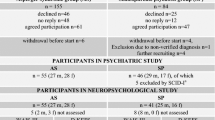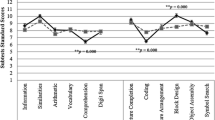Abstract
Asperger syndrome (AS) is a disorder of early childhood characterized by autistic social deficits, subtle communication impairment, and excessive isolated interests. There is no history of language delay or of mental retardation. Despite its increasing popularity as a distinct condition, its diagnostic validity remains uncertain. It is still unclear to what extent AS differs from autism with normal intelligence sometimes referred to as high-functioning autism (HFA). However, some reports have suggested that persons with AS possess a distinct profile on tests of intelligence characterized by a high verbal IQ and a low performance IQ, whereas in most cases with HFA, the pattern is reversed. Since few studies have directly compared AS subjects with HFA controls using unmodified diagnostic criteria and standardized measures of assessment, in this report we compared 22 AS subjects with 12 HFA controls, matched on age, sex and level of intelligence. As a group, subjects with AS showed a higher verbal IQ and higher scores on information and vocabulary subtests than those with HFA. However, scores of several AS and HFA subjects showed a mixed pattern. Implications of these findings are discussed in the context of the validity of Asperger Syndrome.
Similar content being viewed by others
References
American Psychiatric Association. (1994). Diagnostic and statistical manual of mental disorders (4th ed.). Washington, DC: Author.
Asperger, H. (1944). Die ‘autistischen psychopathen’ im kindersalter. Archiv fur Psychiatrie und Nevenkrankheiten, 117, 76-136.
Bailey, A., Phillips, W., & Rutter, M. (1996). Autism: Towards an integration of clinical, genetic, neuropsychological, and neurobiological perspectives. Journal of Child Psychology and Psychiatry, 37, 89-126.
DeMyer, M., Hingten, J. M., & Jackson, R. K. (1981)Infantile autism reviewed: A decade of research. Schizophrenia Bulletin, 7, 388-451.
Fein, D., Pennington, B., Markowitz, P., Braverman, M., & Waterhouse, L. (1986)Toward a neuropsychological model of infantile autism: Are the social deficits primary? Journal of the American Academy of Child and Adolescent Psychiatry, 25, 2,198-212.
Ghaziuddin, M., Leininger, L., & Tsai, L. (1995). Thought disorder in Asperger syndrome: Comparison with high-functioning autism. Journal of Autism and Developmental Disorders, 25, 3,311-317.
Ghaziuddin, M., Butler, L., Tsai, L., & Ghaziuddin, N. (1994). Is clumsiness a marker for Asperger syndrome? Journal of Intellectual Disability Research, 38, 519-527.
Gillberg, C. (1998)Asperger syndrome and high-functioning autism. British Journal of Psychiatry, 172, 200-209.
Klin, A. (2000). Attributing social meaning to ambiguous visual stimuli in higher-functioning autism and Asperger syndrome: The social attribution task. Journal of Child Psychology and Psychiatry, 7, 831-846.
Klin, A., Volkmar, F. R., Sparrow, S. S., Cichetti, D. V.& Rourke, B. P. (1995). Validity and neuropsychological characterization of Asperger syndrome. Journal of Child Psychology and Psychiatry, 36, 1127-1140.
Le Couteur, A., Rutter, M., Lord, C., Rios, P., Robertson, S., Holdgrafer, M., & McLennan, J. D. (1989). Autism diagnostic interview: A semistructured interview for parents and caregivers of autistic persons. Journal of Autism and Developmental Disorders, 19, 363-387.
Lincoln, A. J., Allen, M. H., & Kilman, A. (1995). The assessment and interpretation of intellectual abilities in people with autism. In E. Shopler & G. B. Mesibov(Eds.), Learning and congnition in autism(pp. 89-117).New York: Plenum.
Manjiviona, J., & Prior, M. (1995). Comparison of Asperger syndrome and high-functioning autistic children on a test of motor impairment. Journal of Autism and Developmental Disorders, 25(1), 23-39.
Miller, J. N., & Ozonoff, S. (2000). The external validity of Asperger syndrome: Lack of evidence from the domain of neuropsychology. Journal of Abnormal Psychology, 109(2), 227-238.
Ozonoff, S., Rogers, S., & Pennington, B. F. (1991). Asperger' syndrome: Evidence of an empirical distinction from high-functioning autism. Journal of Child Psychology and Psychiatry, 32, 1107-1122.
Ozonoff, S., South, M., & Miller, J. N. (2000). DSM-IV-defined Asperger syndrome: Cognitive, behavioral and early history differentiation from high-functioning autism. Autism, 4(1), 29-46.
Rourke, B. (1989)Nonverbal learning disabilities: The syndrome and the model New York: Guilford Press.
Rourke, B., Ahmad, S. A., Collins, D. W., Hayman-Abello, B.A., Hayman-Abello, S. E., &Warriner, E.M.Child clinical/pediatric neuropsychology: Some recent advances. (2002). Annual Reviews Psychology, 543, 309-339.
Rutter, M. (1978). Language disorder and infantile autism. In M. Rutter & E. Schopler(Eds.), Autism: A reappraisal of concepts and treatment(pp. 85-104).New York: Plenum Press.
Sattler, J. M. (1992). Assessment of children: Revised and updated third edition San Diego: Author.
Schopler, E.& Mesibov, G. (1998). Introduction. In E. Schopler & G. Mesibov(Eds.), Asperger Syndrome or high-functioning autism? pp. (3-9).New York: Plenum Press.
Siegel, D. J., Minshew, N. J., & Goldstein, G. (1996). Wechsler IQ profiles in diagnosis of high-functioning autism. Journal of Autism and Developmental Disorders, 26, 389-406.
Szatmari, P., Tuff, L., Finlayson, M. A. J., & Bartolucci, G. (1989). Asperger's syndrome and autism: Neurocognitive aspects. Journal of the American Academy of Child and Adolescent Psychiatry, 29, 130-136.
Wechsler, D. (1992). Wechsler intelligence scale for children (3rd ed.). San Antonio, Texas: Psychological Corporation.
Wechsler, D. (1997). Wechsler adult intelligence scale-revised New York: Psychological Corporation.
Wing, L. (1981). Asperger's syndrome: A clinical account. Psychological Medicine, 11, 115-129.
Author information
Authors and Affiliations
Corresponding author
Rights and permissions
About this article
Cite this article
Ghaziuddin, M., Mountain-Kimchi, K. Defining the Intellectual Profile of Asperger Syndrome: Comparison with High-Functioning Autism. J Autism Dev Disord 34, 279–284 (2004). https://doi.org/10.1023/B:JADD.0000029550.19098.77
Issue Date:
DOI: https://doi.org/10.1023/B:JADD.0000029550.19098.77




